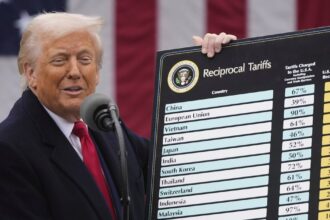In a startling escalation of pre-election rhetoric, former President Donald Trump claimed Thursday that under his potential second administration, the United States would coordinate with Israel to launch strategic strikes against Iranian nuclear facilities. The controversial statement comes amid heightened tensions in the Middle East and raises profound questions about future American foreign policy.
“When I win the election, we’re going to help Israel take out Iran’s nuclear sites,” Trump declared at a private fundraising event in Florida, according to sources familiar with the gathering. This marked one of his most explicit threats toward Tehran since leaving office in 2021.
The statement arrives at a particularly volatile moment in Middle East politics. Israel continues to engage in conflict with Hamas in Gaza, while simultaneously managing escalating tensions with Hezbollah along its northern border with Lebanon. Iran, which maintains significant influence over both militant groups, has repeatedly threatened retaliation against Israel for its ongoing military operations.
Foreign policy experts express grave concerns about the implications of such statements. “Pre-announcing military strikes against sovereign nations, particularly targeting nuclear facilities, represents a dramatic departure from traditional American diplomatic approaches,” notes Dr. Eleanor Matheson, professor of international relations at the University of Toronto.
The Iranian government swiftly condemned Trump’s remarks as “dangerous warmongering” and reaffirmed its position that its nuclear program exists solely for peaceful energy purposes. However, the International Atomic Energy Agency has reported multiple instances of Iranian non-compliance with nuclear monitoring agreements in recent years.
Current polling shows Trump maintaining competitive standing in key battleground states against President Biden, raising legitimate questions about whether such campaign rhetoric could translate into actual policy. Historical precedent suggests Trump has followed through on various foreign policy promises from his previous campaign, including withdrawing from the Iran nuclear deal in 2018.
Defense analysts point out that military strikes against hardened and dispersed Iranian nuclear facilities would present extraordinary challenges. “These aren’t simple targets,” explains retired General James Harrington. “Many are buried deep underground, protected by sophisticated air defense systems, and striking them would require extensive planning and substantial military resources.”
The Biden administration distanced itself from Trump’s remarks, with State Department spokesperson Vanessa Chen stating, “The United States remains committed to preventing Iran from acquiring nuclear weapons through diplomatic channels and international cooperation.” She emphasized that official U.S. policy has not changed.
As Canada maintains its role in multilateral efforts regarding Iran’s nuclear program, these developments carry significant implications for our foreign policy approach. Economic repercussions from any major conflict would inevitably impact global markets and energy prices.
The controversy underscores fundamental questions about American presidential authority in matters of war and peace. While presidents have significant latitude as commanders-in-chief, congressional approval is constitutionally required for declarations of war – though modern conflicts have frequently operated in gray areas of this requirement.
As we navigate this uncertain geopolitical landscape, Canadians must consider how potential shifts in U.S. foreign policy might affect our own security interests and international relationships. Will campaign rhetoric translate into actual military action, or is this simply political posturing designed to project strength to domestic audiences?











